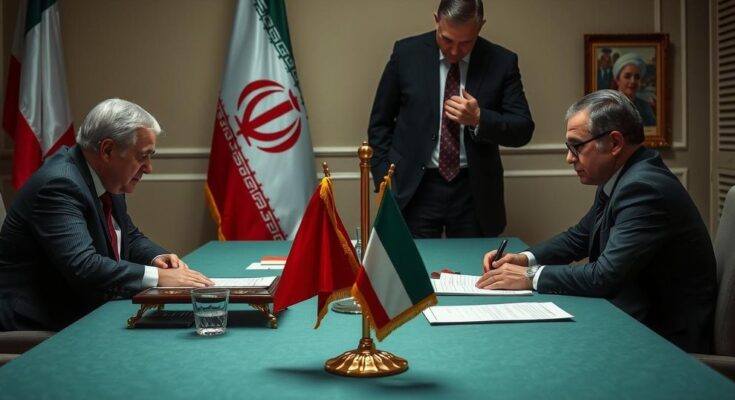Iran has proposed a prisoner swap to Italy, conditional on the release of detained Iranian national Mohammad Abedini, while Cecilia Sala, an Italian journalist, remains in solitary confinement with poor conditions. The Italian government is navigating the complexities of this situation amidst international pressures, with calls for a resolution that ensures Sala’s release without jeopardizing legal proceedings.
Iran has communicated to Italy its intention to pursue a prisoner swap involving an Italian journalist detained in Iran, Cecilia Sala, who was arrested last month and is currently in solitary confinement. Iranian officials have indicated that Sala’s release is contingent upon Italy releasing Iranian national Mohammad Abedini Najafabadi, who is detained in Italy at the request of U.S. authorities for alleged involvement in terrorist activities. This stipulation had not been publicly disclosed prior to this communication.
Cecilia Sala, 29, was taken into custody under unspecified charges while using a valid press pass. Sources familiar with the discussions indicated that Iran has expressed willingness to release her on humanitarian grounds if her case is resolved favorably for Abedini. Despite the delicate nature of the negotiations and the Italian government’s desire for a swift resolution, they have not publicly acknowledged Iran’s swap proposal.
Following her arrest, Sala reported severe conditions in her confinement. Her basic necessities, including prescription glasses and personal items sent by the Italian embassy, were reportedly not delivered. There have been no formal charges brought against her, which might suggest that Iranian officials are maintaining ambiguity to exercise leverage in the diplomatic negotiations.
Italian officials have been careful in their statements regarding the link between Sala’s arrest and Abedini’s case. Prime Minister Giorgia Meloni recognized the complexity of the situation and confirmed that all potential avenues of dialogue are being utilized to secure Sala’s release. Furthermore, the U.S. State Department has publicly called for the immediate release of Sala and others detained for political reasons in Iran, reflecting the broader geopolitical implications of this case.
As the negotiations continue, it remains unclear how the situation will unfold, particularly with the underlying tensions between Iran, the U.S., and Italy. The Italian government faces the challenging task of balancing diplomatic engagement with legal obligations and public expectations regarding Sala’s wellbeing. The urgency of Sala’s situation has spurred discussions at the highest levels of Italian leadership as they aim for a resolution that ensures her freedom without compromising their legal system.
The context of the ongoing diplomatic negotiations between Italy and Iran revolves around the detention of an Italian journalist, Cecilia Sala, who was arrested under unclear circumstances while on assignment in Iran. Sala’s case has been linked to the detention of Mohammad Abedini Najafabadi, an Iranian national arrested in Italy due to allegations of involvement in terrorism at the behest of U.S. authorities. This development has escalated the complexity of the situation, as Iran has expressed demands for a prisoner swap, which has significant implications for Italy’s diplomatic relations with both Iran and the United States. Sala’s family has voiced concerns over her conditions in detention, further complicating the negotiations as Italian officials navigate between legal proceedings and humanitarian concerns.
In conclusion, the situation surrounding Cecilia Sala’s arrest in Iran has brought to light the complexities of international diplomacy, particularly regarding prisoner swaps and the implications of geopolitical tensions. As Italy grapples with demands from Iran and ongoing legal pressures related to Abedini, the safety and wellbeing of Sala remain a priority. The outcome of these negotiations will be crucial not only for Sala’s future but also for the broader dynamics of Italy’s relationship with both Iran and the United States, highlighting the delicate interplay of justice, diplomacy, and human rights.
Original Source: www.iranintl.com




